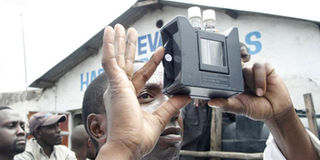Africa should come and learn from water revolution in Nairobi’s slums

An official from the Nairobi Water and Sewerage Company (NWSC) checks the level of Chlorine in water from a vendor at the Mukuru kwa Njenga slum when the company visited the slum to ensure that the residents are taking clean water following the outbreak of cholera in 2009. FILE PHOTO | JENNIFER MUIRURI | NATION MEDIA GROUP
What you need to know:
- Residents load money onto the water smart cards at a nearby kiosk or via mobile payments, and then tap into the machine how many litres they want to buy, and the rest is history.
- Some years ago Uganda offered whistleblowers a 10 per cent cut of the tax collected from a dodger whose fraud they had secretly revealed to the taxman.
- If a ministry is overseeing, say, a Sh24 billion schools laptop project but delivers it to the specified quality for Sh20 billion, the ministry shares the Sh4 billion the way a company would do with a bonus from a good trading year.
From Cape Town to Alexandria in Egypt, public utilities — especially water, electricity, and transport companies — are the most hated and despised institutions in Africa.
And for good reason too. They are mostly hopeless, really. But today, it is only fair to squeeze in a good word for the State-run Nairobi Water and Sewerage Company (NWSC).
NWSC has installed water “ATMs” in Nairobi slums. Residents can use machines that are similar to those for accessing cash to buy clean water, with customers able to buy affordable water using smart cards.
Residents load money onto the water smart cards at a nearby kiosk or via mobile payments, and then tap into the machine how many litres they want to buy, and the rest is history.
This could turn out to be for water in the world, what Safaricom’s M-Pesa became for micro payments.
The real revolutionary aspect of the water “ATMs” is that they are doing four things that otherwise rarely go together. First, the water is legal. Secondly it is clean safe. Thirdly, it is cheaper — actually six times cheaper than previous water sources like the chap who sells it from jerry cans off his cart. And, finally, it is still profitable.
How is this possible? Technology and economies of scale partly enable NWSC to do that, but the real magic is because it is based on good old-fashioned free market common sense.
The machines are operated by local youth and women groups who earn 40 per cent of the profits from the water sales as an incentive to ensure they are kept running and the system is not vandalised, as happened with past attempts to pipe water to the slums.
While everything about the water “ATMs” is noteworthy, for some of us it is the latter that is truly interesting.
What other public goods can the people of Kenya and Nairobi help deliver if they are given an incentive to make a little profit from it?
We shall begin with the most unpopular — roads in the side streets and the suburbs. A lot of these roads are in a terrible state and politics and corruption in municipal authorities means they will remain pot-holed for a long time to come.
Road tolls should be implemented here, but they should not be paid to city and town councils. They should be paid to residents’ associations which, fortunately for Kenya, work much better than in most of Africa. The residents’ associations will then take over the maintenance of the roads and streets.
Another area is preventing tax cheating. Some years ago Uganda offered whistleblowers a 10 per cent cut of the tax collected from a dodger whose fraud they had secretly revealed to the taxman.
It did not work, first because a tax dodger is probably a dangerous person and would kill you if he found out it was you who snitched on him. And because of corruption, he is able to pay someone at the tax office for that information. Because of the risk, the 10 per cent whistleblower’s commission was too low.
However, 35-50 per cent would certainly work miracles. The Kenya Revenue Authority would just have tax money falling out of its ears.
Another potentially rich area is corruption and waste in the public sector.
Here, the same principle would apply as in the tax scheme. Public servants could be offered 15 per cent of the public funds recovered from crooked officials if they are caught based on information they gave.
Thus if you sneak off files about the theft of Sh1 billion to the anti-corruption agency and the thief is caught, your cut is over Sh150 million.
The other is to do with waste. If a ministry is overseeing, say, a Sh24 billion schools laptop project but delivers it to the specified quality for Sh20 billion, the ministry shares the Sh4 billion the way a company would do with a bonus from a good trading year.
The big men and women at the top would get a bigger slice, but the masses too, including the office cleaners and tea girls, would get a piece.
We have tried to appeal to people’s good and God-fearing sides, to their sense of shame, to their “Ubuntu” and such things, and it is not working. It is time to exploit the seduction of profit and to harness greed for public good.
The author is editor of Mail & Guardian Africa. Twitter:@cobbo3





